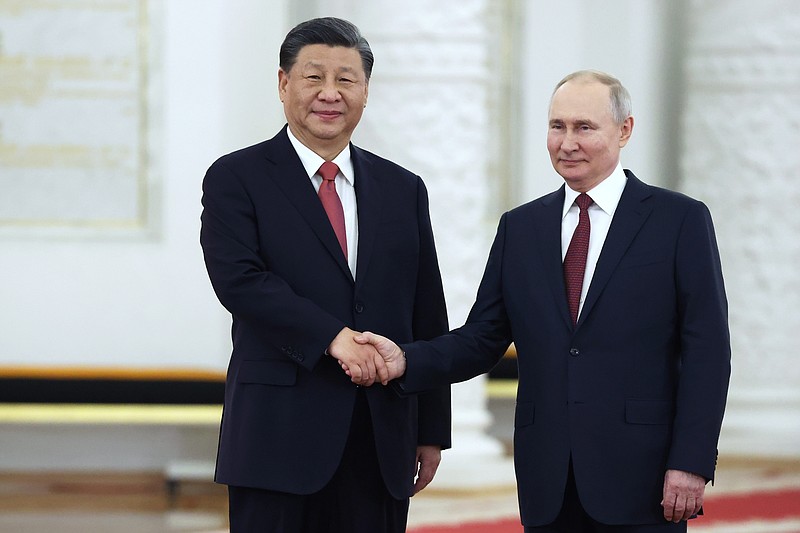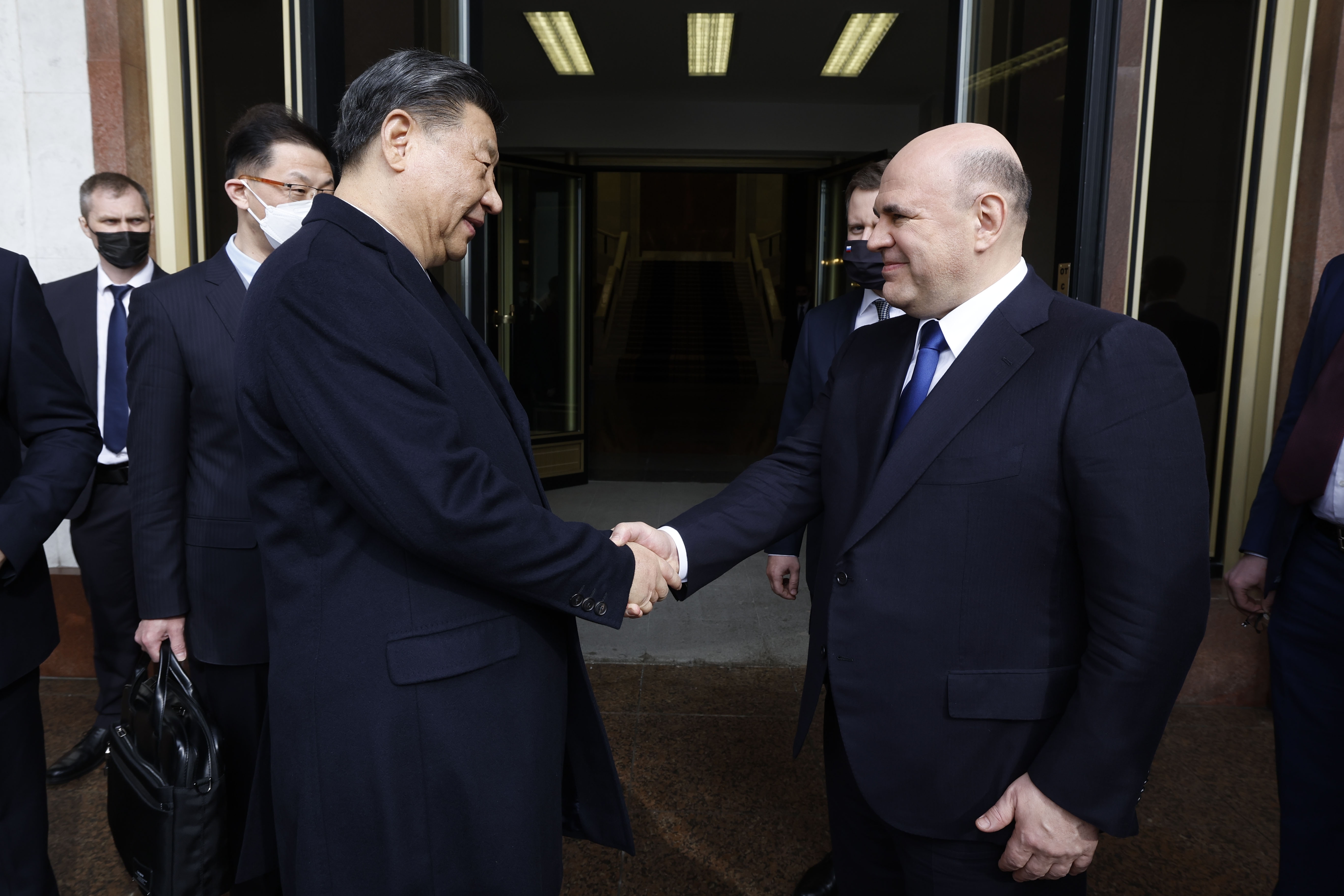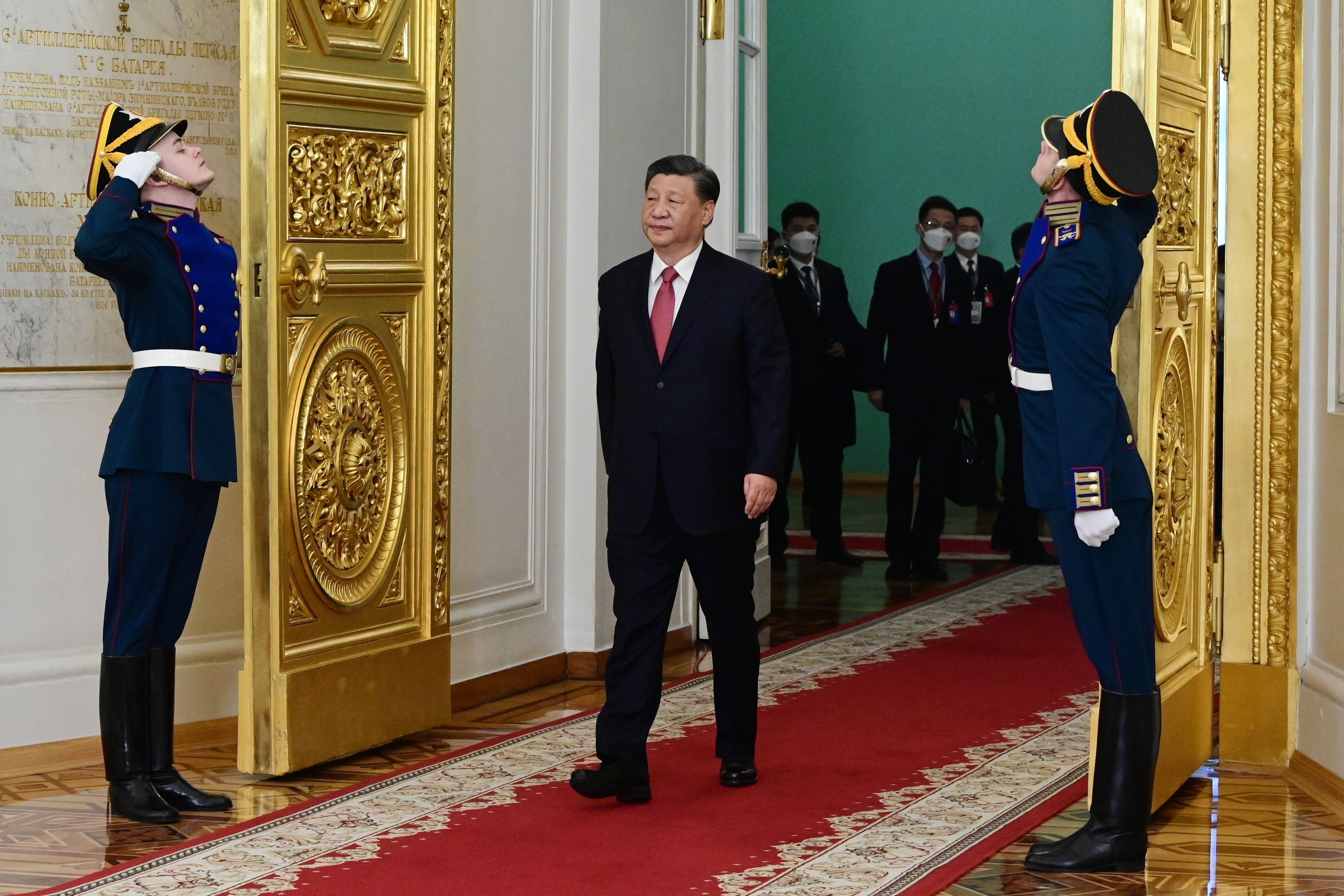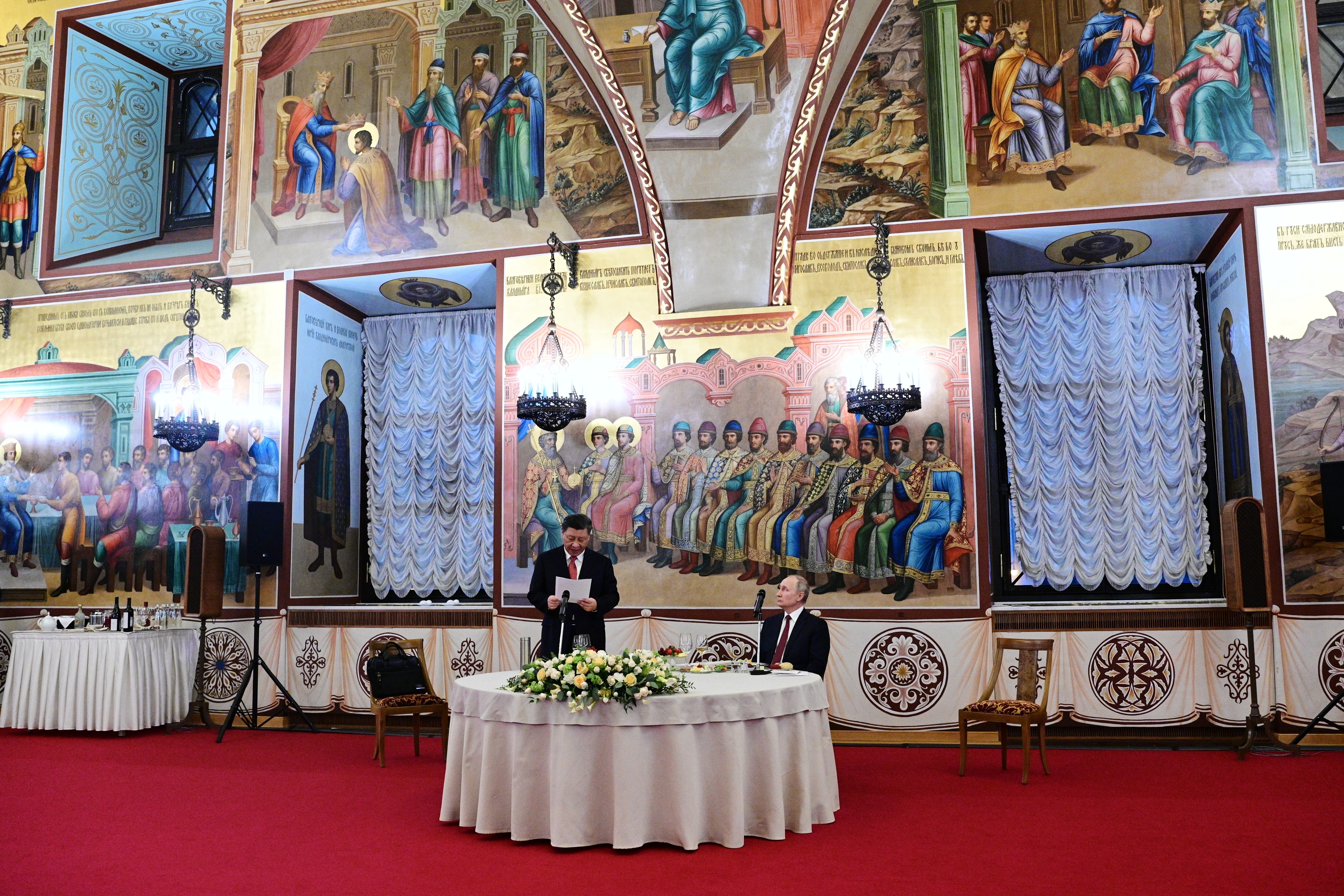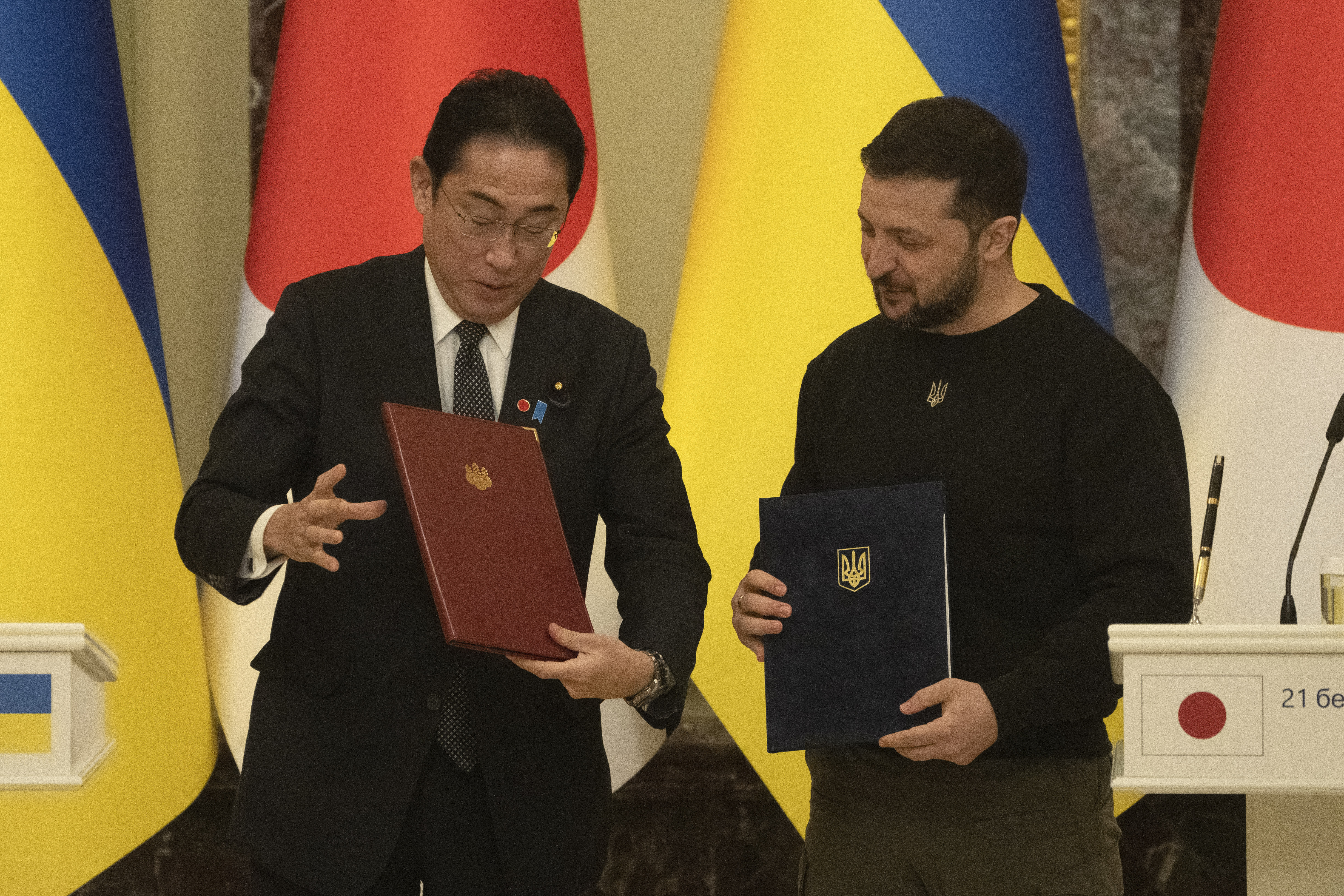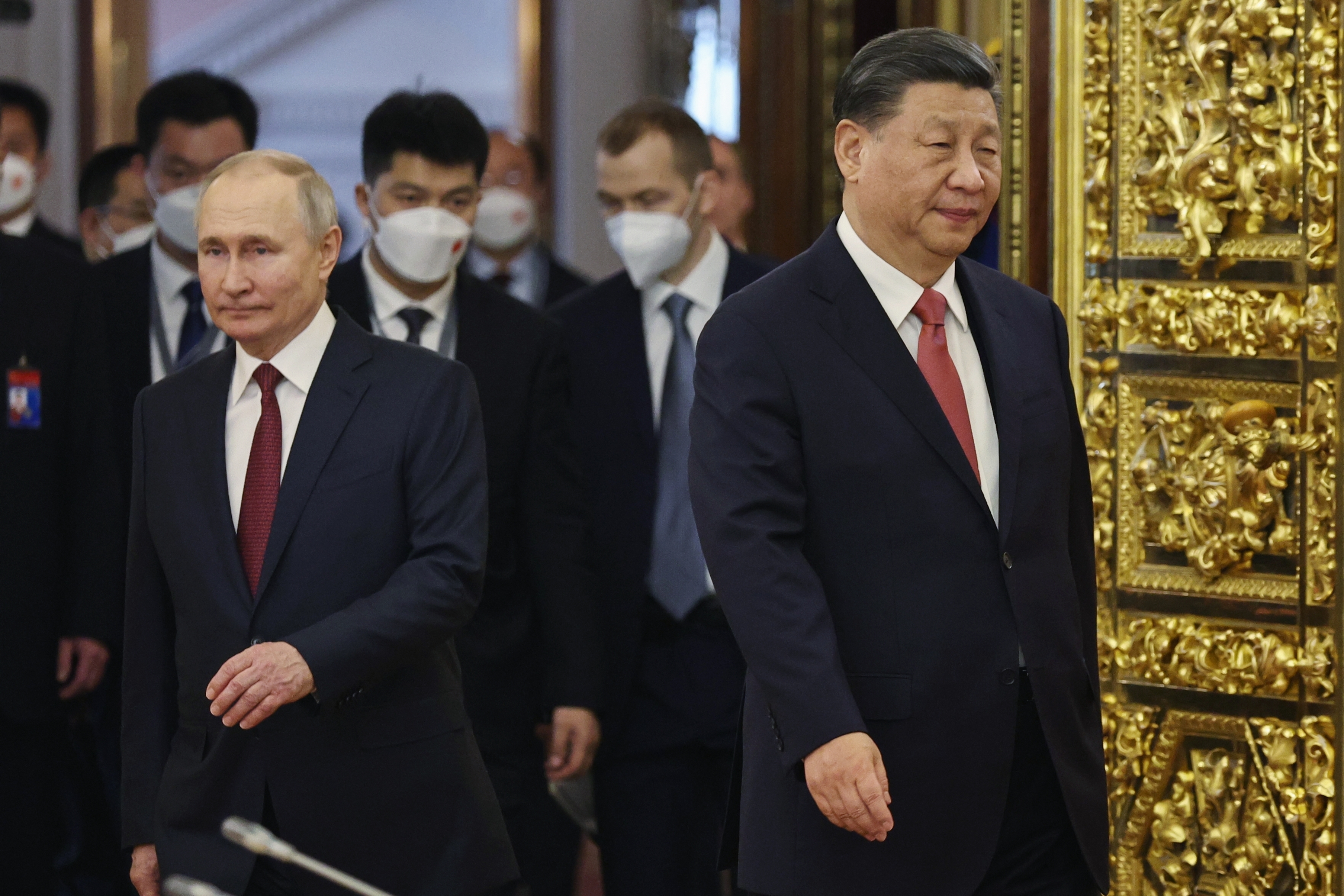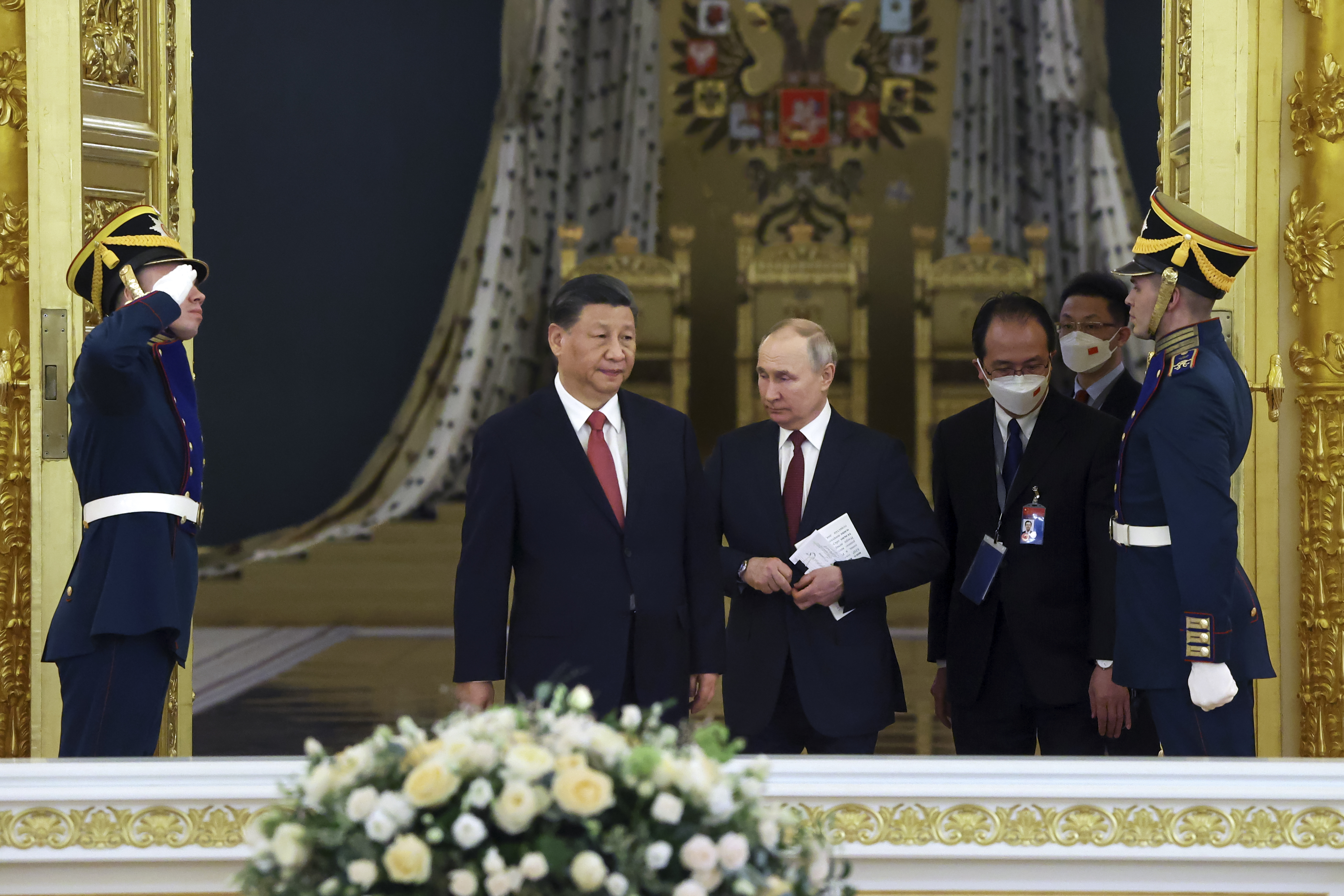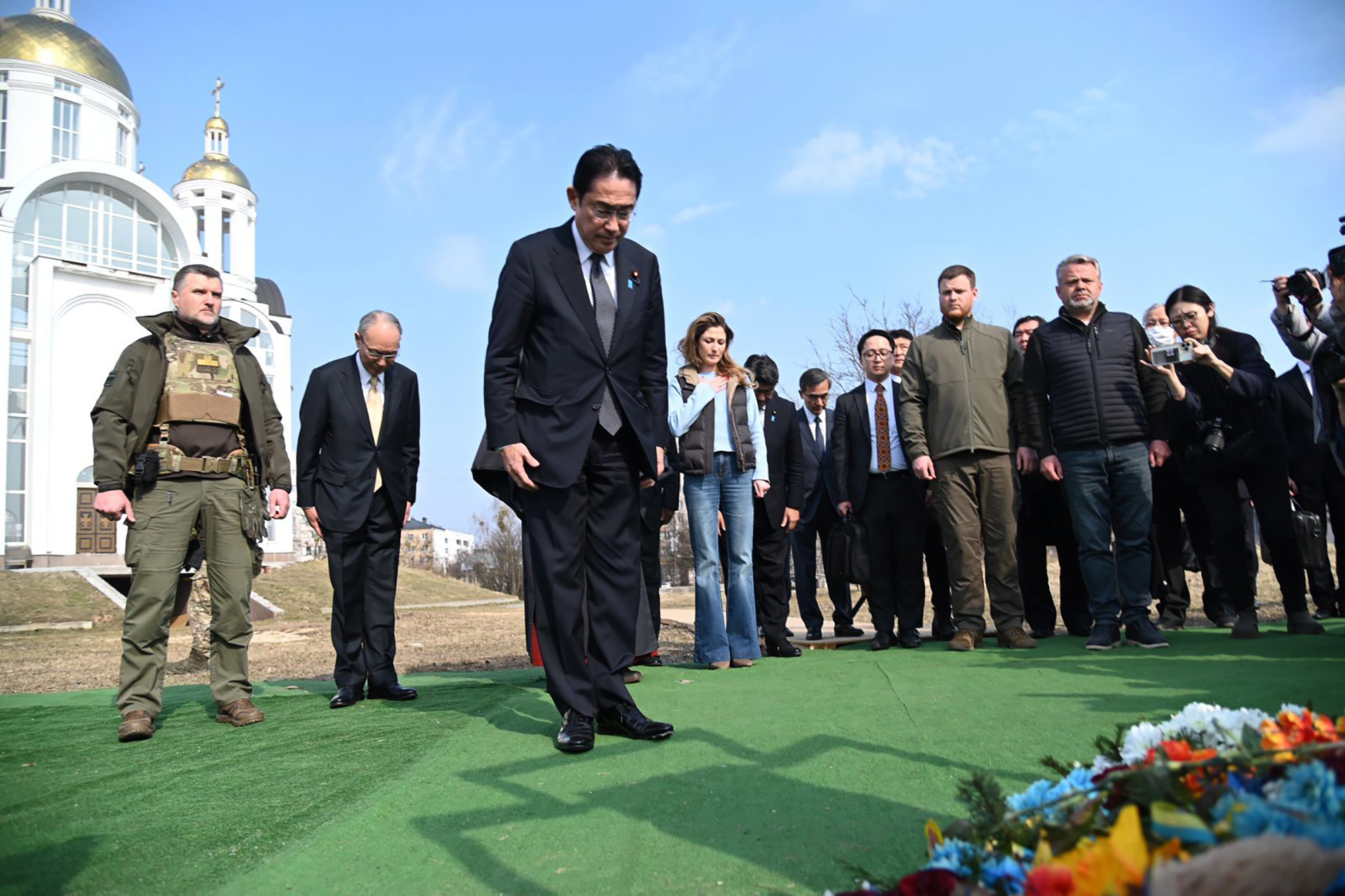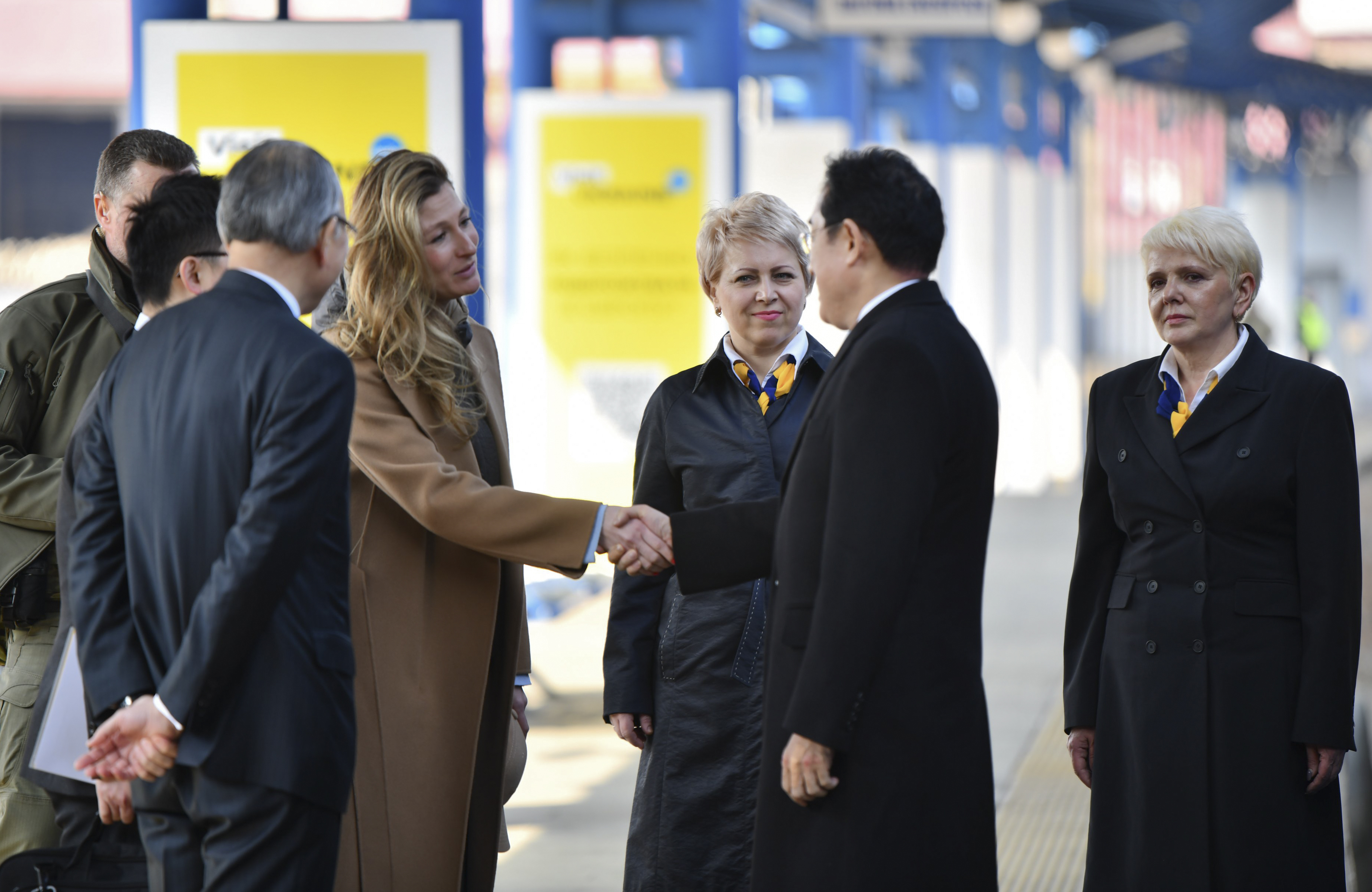KYIV, Ukraine -- Prime Minister Fumio Kishida of Japan made a surprise visit Tuesday to Kyiv, engaging in dueling diplomacy with Asian rival President Xi Jinping of China, who met in Moscow with Russian President Vladimir Putin to promote Beijing's peace proposal for Ukraine that Western nations have all but dismissed as a non-starter.
The two visits, about 500 miles apart, highlighted how countries are lining up behind Moscow or Kyiv during the nearly 13-month-old war. Kishida, who will chair the Group of Seven summit in May, became the group's last member to visit Ukraine and meet President Volodymyr Zelenskyy, after paying tribute to those killed in Bucha, a town that became a symbol of Russian atrocities against civilians.
Xi and Putin announced no major progress toward implementing the Chinese peace deal, although the Russian leader said it could be a basis for ending the fighting when the West is ready. He added that Kyiv's Western allies have shown no interest in that.
U.S. officials have said any peace plan coming from the Putin-Xi meeting would be unacceptable because a cease-fire would only ratify Moscow's territorial conquests and give Russia time to plan for a renewed offensive.
"It looks like the West indeed intends to fight Russia until the last Ukrainian," Putin said, adding the latest threat is a British plan to give Ukraine tank rounds containing depleted uranium.
"If that happens, Russia will respond accordingly, given that the collective West is starting to use weapons with a nuclear component," he said, without elaborating. Putin has occasionally warned that Russia would use all available means, including possibly nuclear weapons, to defend itself, but also has sometimes backed off such threats.
Putin's comment referred to remarks Monday by U.K junior Defense Minister Annabel Goldie, who wrote: "Alongside our granting of a squadron of Challenger 2 main battle tanks to Ukraine, we will be providing ammunition, including armor-piercing rounds which contain depleted uranium. Such rounds are highly effective in defeating modern tanks and armored vehicles."
Russian Foreign Minister Sergey Lavrov said the plan shows that the British "have lost the bearings," and Defense Minister Sergei Shoigu said "it marked another step, and there aren't so many of them left."
But weapons expert Hamish de Bretton-Gordon, former commander of Britain's Royal Tank Regiment, said it was "reckless" of Putin "to try and suggest Britain is sending nuclear material" to Ukraine. He said depleted uranium is a common component of tank rounds, possibly even used by Russia.
"Putin insinuating that they are some sort of nuclear weapon is bonkers," he told The Associated Press. "Depleted uranium is completely inert. There is no way that you could create a nuclear reaction or a nuclear explosion with depleted uranium."
Beijing insists it is a neutral broker in Ukraine, and Xi said after his talks with Putin: "We adhere to a principled and objective position on the Ukrainian crisis based on the goals and principles of the U.N. Charter." The Chinese plan seeks to "actively encourage peace and the resumption of talks," he said.
In a joint statement, Russia and China emphasized the need to "respect legitimate security concerns of all countries" to settle the conflict, echoing Moscow's argument that it sent in troops to prevent the U.S. and its NATO allies from turning the country into an anti-Russian bulwark.
"Russia welcomes China's readiness to play a positive role in the political and diplomatic settlement of the Ukrainian crisis" and the "constructive ideas" contained in Beijing's peace plan, the statement said. It added: "The parties underline that a responsible dialogue offers the best path for a lasting settlement ... and the international community should support constructive efforts in this regard."
The White House made a sharp rebuttal to the joint statement, accusing China of parroting Russian propaganda and saying Beijing could do far more if it truly wanted to broker peace.
"If China wants to play a constructive role in this conflict, then it ought to press Russia to pull troops out of Ukraine," John Kirby, a U.S. national security spokesperson, told reporters.
In contrast, American officials praised Japan's prime minister. On his unusual, unannounced trip to Kyiv, Kishida announced $470 million in aid for energy and other sectors, and $30 million in nonlethal equipment aid to Ukraine through a NATO trust fund. In a news conference, he called Russia's actions "an aggression that shakes the foundation of international order."
After meeting Kishida, Zelenskyy told reporters his team had sent his own peace formula to China but hasn't heard back, adding that there were "some signals, but nothing concrete about the possibility of a dialogue."
Kishida called Russia's invasion a "disgrace that undermines the foundations of the international legal order" and pledged to "continue to support Ukraine until peace is back on the beautiful Ukrainian lands."
Hours before Xi and Putin dined at a state dinner in glittering Kremlin opulence, Kishida laid flowers at a church in Bucha for the town's victims.
"Upon this visit to Bucha, I feel a strong resentment against cruelty," he said. "I would like to represent the people in Japan, and express my deepest condolences to those who lost their loved ones, were injured as a result of this cruel act."
U.S. Ambassador to Japan Rahm Emanuel noted the "two very different European-Pacific partnerships" that unfolded Tuesday.
"Kishida stands with freedom, and Xi stands with a war criminal," Emanuel tweeted, referring to Friday's decision by the International Criminal Court to issue an arrest warrant for Putin, saying it wanted to put him on trial for the abductions of thousands of children from Ukraine.
Kyiv's allies pledged more support. Washington is accelerating its delivery of Abrams tanks to Ukraine, sending a refurbished older version that can be ready faster, the Pentagon announced. The aim is to get the 70-ton behemoths to the war zone by fall.
The Russia-China front against the West was a prominent theme of Xi's visit. Russia's Deputy Foreign Minister Sergei Ryabkov accused NATO of seeking to become the world's dominant military force. "That is why we are expanding our cooperation with China, including in the security sphere," he said.
Putin is keen to show he has a heavyweight ally and market for Russian energy products under Western sanctions. He and Xi signed agreements on economic cooperation, noting Russian-Chinese trade rose by 30% last year to $185 billion and is expected to top $200 billion this year.
Russia stands "ready to meet the Chinese economy's growing demand for energy resources" by boosting deliveries of oil and gas, he said, while listing other areas of cooperation, including aircraft and shipbuilding industries and other high-tech sectors.
Whether China will provide military support is a key question. Western officials "have seen some signs" Putin also wants lethal weapons from Beijing, though there is no evidence it has granted his request, NATO Secretary-General Jens Stoltenberg said in Brussels.
Further contacts are planned. Xi said he invited Putin to China this year to discuss a regional initiative that seeks to extend Beijing's influence through economic cooperation.
At their meeting, Xi indicated that he could also extend Putin an economic lifeline, albeit one that would also benefit China by extending its access to Russian resources, energy and markets. And although Xi called the talks "frank, friendly and rich in results," and Putin called them "successful," it was not clear that the Russian leader had accomplished everything he had sought.
The agreements included two broad statements about strategic and economic cooperation, and smaller items about working together in sectors like forestry, soybeans, television and industry in Russia's Far East, according to a list released by the Kremlin. Some agreements were incremental updates to decisions made before the summit, like one regarding a nuclear power plant Russia is building in China.
Putin boasted that a new pipeline for sending natural gas to China via Mongolia would be ready by 2030, but Xi did not confirm such an agreement was in place.
The subtext of the meeting, analysts said, was Russia's increasing reliance on China over the past 13 months. Xi and Putin have remained closely aligned through that time, but not always with the public enthusiasm the Chinese leader once showed.
Moscow and Beijing have both weathered international condemnation of their human rights records. The Chinese government is accused of atrocities against Uighur Muslims in its far western Xinjiang region. The allegations include genocide, forced sterilization and the mass detention of nearly 1 million Uighurs. Beijing has denied the allegations. Russia has been accused of war crimes in Ukraine, charges it denies.
Kishida embarked for Ukraine from India, where he had met with Prime Minister Narendra Modi on issues including protecting freedom of navigation in the Pacific.
In a speech Monday at the Indian Council of World Affairs, a research institute in New Delhi, Kishida said that Russia's war had driven a "paradigm shift" in global affairs.
"Russia's aggression against Ukraine obliges us to face the most fundamental challenge: defending peace," he said, according to prepared remarks.
Kishida flew from India to Poland, where he boarded a train to Kyiv, according to NHK, the Japanese public broadcaster. The secretive journey was highly unusual for a prime minister in Japan, where the leader's movements are typically broadcast well in advance and reported in detail. Japan's Kyodo News agency reported Tuesday afternoon that he had arrived in Kyiv.
Both China and Japan have enjoyed recent diplomatic successes that emboldened their foreign policy.
Japan, which has engaged in territorial disputes over islands with both China and Russia, is particularly concerned about the Beijing-Moscow relationship. Both nations have conducted joint military exercises near Japan's coasts.
Beijing's diplomatic foray follows its recent success in brokering a deal between Iran and its chief Middle Eastern rival, Saudi Arabia, to restore relations after years of tensions. The move displayed China's influence in a region where Washington has long been the major foreign player.
Kishida became Japan's first postwar leader to enter a war zone.
Due to its pacifist principles, Japan's support for Ukraine has been limited to nonlethal equipment and humanitarian supplies. It has contributed more than $7 billion to Ukraine and accepted more than 2,000 displaced Ukrainians, despite its strict immigration policy.
Tokyo joined the U.S. and European nations in sanctioning Russia over the invasion. By contrast, China has refused to condemn Moscow's aggression and criticized Western sanctions against Moscow, while accusing NATO and Washington of provoking Putin's military action.
Japan fears the possible impact of a war in East Asia, where China's military has grown increasingly assertive and has escalated tensions around self-ruled Taiwan, which Beijing claims as its territory.
In Beijing, Foreign Ministry spokesperson Wang Wenbin said of Kishida's trip: "We hope Japan could do more things to deescalate the situation instead of the opposite."
Information for this article was contributed by Karl Ritter, Mari Yamaguchi, Lolita C. Baldor and Jill Lawless of The Associated Press and by Ben Dooley, Victoria Kim, Valerie Hopkins and Chris Buckley of The New York Times.
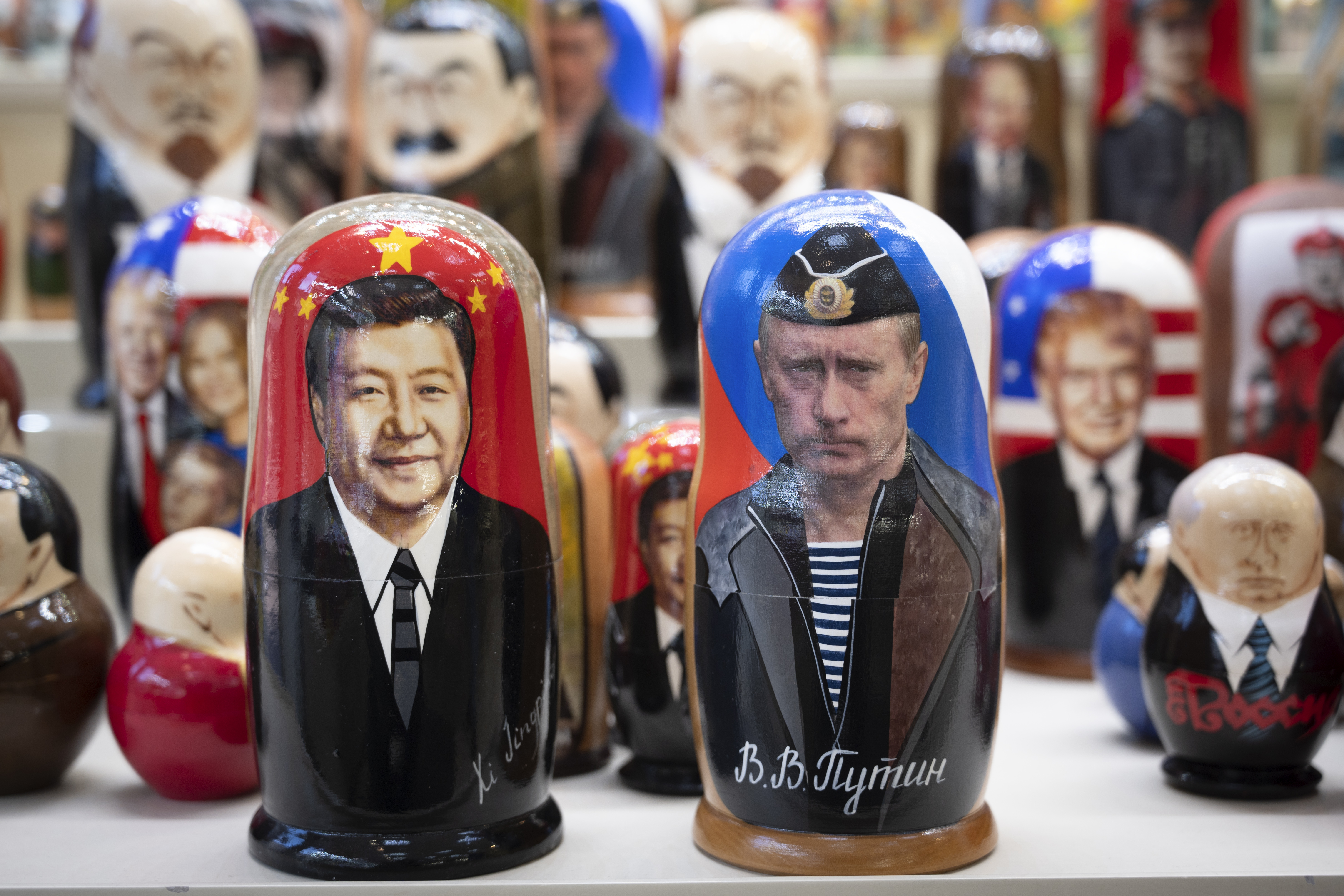 Russian matryoshka dolls with portraits of the Chinese President Xi Jinping, left, and Russian President Vladimir Putin are displayed among others for sale at a souvenir shop in Moscow, Russia, Tuesday, March 21, 2023. Chinese President Xi Jinping arrived in neighbouring Russia for a three-day trip for the talks with Russian President Vladimir Putin. (AP Photo/Dmitry Serebryakov)
Russian matryoshka dolls with portraits of the Chinese President Xi Jinping, left, and Russian President Vladimir Putin are displayed among others for sale at a souvenir shop in Moscow, Russia, Tuesday, March 21, 2023. Chinese President Xi Jinping arrived in neighbouring Russia for a three-day trip for the talks with Russian President Vladimir Putin. (AP Photo/Dmitry Serebryakov)Gallery: Fumio Kishida surprise visit to Kyiv
